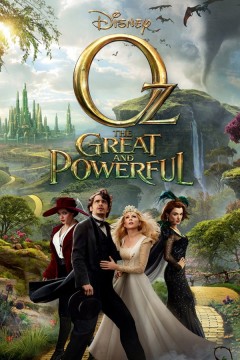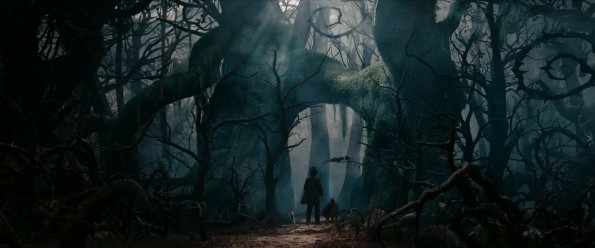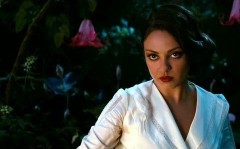
It seems that every classic is to have an entourage. The loneliness of such films as Alien, Star Wars, and King Kong is too much to bear for the hearts of movie execs, so companions are made for them. Sequels, prequels, remakes, and spinoffs are what Hollywood does most, though not necessarily best. At times, this proclivity has born sweet fruit. Though sequels are rarely as good as the original, if the original was any good at all, there have been some smashing successes. Even remakes have some achievements to be noted. I am, however, unaware of a prequel or a spinoff whose makers could hold their heads high and proud once their creation hit the silver screen. Oz the Great and Powerful, a prequel to the 1939 classic The Wizard of Oz, is unable to break out of this trend and be the first.
Set some years before the events of Victor Fleming’s work, it tells the tale of the wizard himself, a travelling magician from Kansas making a meager, day-to-day living. A magician is a trickster, of sorts, and Oscar Diggs (James Franco) has a character well suited to it. Though one gets the sense that at his core he is not entirely amoral, he lies to friend and stranger alike. He lusts after money and women, whom he tricks for his own benefit.
It is this very duplicity in his nature that gets him running from trouble and sets him on course for Oz. After flirting with the wife of a circus strongman, he escapes the enraged husband in a hot air balloon just as a tornado begins to ravage the landscape. As happened in the original film to Dorothy, the tornado transports him to the magical Land of Oz. There, he meets Theodora, a witch played by Mila Kunis.
It is not long before he is mistaken for a wizard of whom a prophecy spoke, a mistake which he declines to correct because of the potential remuneration. Being a wizard of prophecy is not easy for one whose magic consists entirely of sleight of hand, but tempted by a treasure room full of gold, Oscar agrees to do what the prophecy says he must: rid the Land of Oz of the evil witch.
The movie boasts two strong points to keep it afloat: The design of the world and complexity of character. The latter of the two comes as something of a surprise because the script is hardly a masterwork. Indeed, I figured the deftness of character creation was due to the original source material, only to find out that this is not based on any of the other Oz books, merely the world itself. What it is doing there is an enigma, then, but whatever causal agent is responsible, it elevates the movie above the muck of worthlessness into which its other attributes, had they been left on their own, would have stuck it.
Oscar Diggs is a man with good and bad traits, with the flaws predominating. Yet he must reach within himself to accomplish a task that becomes more and more altruistic as the movie progresses, and all of this without a sudden, drastic conversion. Oscar Diggs never loses or changes who he is, but he does find good in himself that was always there, hinted at before but never shining clearly through. All of this, it should be added, is accomplished without making a caricature of any particular attribute.
The scenery, as I mentioned, is often a pleasure. Though it is CGI and CGI cannot, as of yet, equal the reality and immediacy of a movie set — even if that movie set has matte paintings — there is much in Oz that attracts, that is fun to look at.

The rest of the movie is ordinary, even poorly wrought. The worst part is James Franco, who simply cannot act. Go to a local theater performance of A Christmas Carol and you’ll find a handful of actors who do as well as or better than Mr. Franco. What he is doing in a movie originally budgeted around $200 million dollars is yet another mystery. I am sad to report that Mila Kunis, who in some indescribable way forgot to look beautiful, does only a little better than her costar. Those scenes where Oscar and Theodora are stuck throwing lines back and forth at each other, pleading for another actor to come on set and save them, are nearly lifeless.
Lazy screenwriting also holds the movie down. From watching Oz, one gets the sense that the filmmakers were in a rush to reveal things to us, to get those moments out of the way so they could get on with something else that truly interested them. The problem here is that a storyteller can exploit the gap between what he knows and what the audience knows, or the gap between a character’s greater knowledge and the audience’s lesser knowledge, or the audience’s greater knowledge and the comparative ignorance of a character. A screenwriter must tease, bring things along bit by bit, not merely dump them out so he can put a check next to that item of the list.
When it came time to reveal that there was a prophecy of a wizard, Theodora simply blurts it out, having deduced very quickly and from very little evidence and yet with absolute certainty that Oscar was the one. Could she not have started out with nothing more than a suspicion that grew into certainty over time? Did she have to give full vent to her hypothesis with a total stranger a handful of seconds after meeting him? Could she not have made hints, instead of absolutes? In short, could the theme of the prophecy not have been developed over the scene, or even multiple scenes, instead of being brought up and dispatched with tension-killing efficiency?
Imagine the soul-numbing awfulness of it: James Franco with a Mila Kunis lowering her game to the level of her colleague in a scene already reverberating with lackluster acting that is then amplified by a script bent on skipping over dramatic tension as rapidly as possible.
But for all that, I cannot report that the film was terrible. Mediocre on net, but not terrible. There are enough good aspects mingling with the bad ones. The aforementioned complexity of Franco’s character, even if the poor fellow cannot portray it properly. Theodora goes through a conversion that elicits our pity, even if the depth of her emotional pain seems greater than warranted by the brevity of her acquaintance with Oscar. The scene where we meet the mystery witch manages to conjure some suspense, even if it is a touch implausible and the witch apparently had no motivation to be where she was other than to show up in the movie.

There is one part of the film that runs the risk of being mistaken for libertarianism, and this error ought to be corrected before it festers. After twists and turns to the plot, which I decline to give away, Oscar finds himself at the head of an army about to be attacked by another, evil army. The problem for him is that his army will not fight, will not commit acts of violence, and yet must defend themselves against the bad guys. This is an interesting predicament and is good for the movie, but I have read whispers on the Internet about this being a libertarian theme. ‘Tis no such matter.
Pacifism is fine for anyone who wants to practice it, and it does not conflict with libertarianism, but the unwillingness to be violent on the part of Oscar’s army does not make a libertarian theme. It delineates in no uncertain terms whom the storytellers consider to be the good guys and whom the bad, nothing more. A libertarian, when under attack, is permitted to respond with violence. A people under attack may, with absolute justice, load, lock and pull the trigger. My concern here is that their pacifism could be seen as the quality that makes them libertarian, when in reality they satisfied that condition by not initiating the coercion. By eschewing violence entirely, they do not become more libertarian, they simply cross a line into pacifism.
It is no surprise that a movie prequel fell short of the original, though this one did better than some others whose names I shall not utter here. I expect that, like the other handful of Oz-related movies, it will be forgotten soon enough. In the meantime, while it is having its run, it is no better or worse than most of the other stuff out there.














